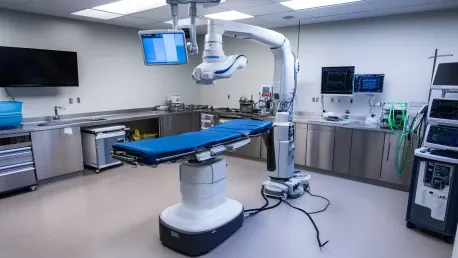Imagine a world where surgeries are precise, efficient, and almost error-free. Picture a scenario where a life-saving operation is performed not by a human surgeon but by an advanced robotic system guided by artificial intelligence. This isn’t a distant future; this is the reality unfolding before our eyes.
Revolutionizing Surgical Precision
In recent years, the integration of AI and robotics in surgery has made significant strides. These advancements are not merely enhancements but transformative innovations that redefine how surgeries are conducted. According to Dr. Emily Sanford, a pioneer in robotic-assisted surgery, “The accuracy and precision offered by AI-driven robotic systems exceed the capabilities of traditional techniques, reducing complications and improving patient outcomes.”
A significant benefit of robotic surgery is the minimization of human error. The robots, programmed with complex algorithms, can accurately perform intricate procedures. Surgeons can control the robotic arms, ensuring unwavering steadiness during operations. This level of precision is particularly vital in neurosurgeries and other high-risk procedures where even a slight error can have profound consequences.
Enhanced Learning and Adaptation
One of the most fascinating aspects of AI-assisted surgery is its ability to learn and adapt. These systems continuously collect data from each operation, using that information to fine-tune their techniques. This constant learning loop means that over time, robotic systems become more adept and efficient. “AI in surgery is like having a student that never stops learning, constantly improving itself with each new experience,” comments Dr. John Hughes, an AI researcher.
For instance, machine learning algorithms can predict potential complications during surgery, alerting the surgical team in real-time. This proactive approach allows for immediate intervention, potentially saving lives. Additionally, the data collected can identify trends and patterns, contributing to the broader medical community’s understanding of disease progression and treatment.
The Role of Surgeons in the Age of AI
The emergence of robotic-assisted surgery has sparked debates about the role of human surgeons. Rather than replacing surgeons, AI and robotics serve as invaluable tools that augment their capabilities. Surgeons can now focus on strategic decision-making, guided by real-time data and insights provided by AI systems.
“I see AI and robotics as an extension of our skills, providing us with abilities we never thought possible,” explains Dr. Maria Thompson, a practicing surgeon. The collaboration between humans and machines creates a synergy that enhances the overall effectiveness of surgical procedures.
Overcoming Challenges and Ethical Considerations
While the benefits are clear, the integration of AI and robotics in surgery is not without its challenges. Data privacy, the reliability of AI systems, and the ethical implications of machine-led medical decisions are all concerns that need addressing. Regulations and policies must evolve to ensure that patient safety and confidentiality remain paramount.
Furthermore, the cost of implementing these advanced systems can be prohibitive for many healthcare facilities. Ensuring equitable access to these technologies is crucial so all patients, regardless of socioeconomic status, can benefit from these groundbreaking advancements.
The Road Ahead
Looking forward, the potential for AI and robotics in surgery is immense. Researchers and engineers are exploring the possibilities of completely automated surgeries for routine procedures. This could revolutionize healthcare accessibility, with robots performing surgeries in remote and underserved areas under the supervision of human surgeons.
Moreover, continuous advancements in AI might lead to predictive healthcare, where diseases are diagnosed and treated proactively rather than reactively. This shift could significantly reduce the burden on healthcare systems, improving overall public health.
As we stand at the precipice of this new era in medical science, it is essential to remember that technological advancements should always prioritize human welfare. By embracing the potential of AI and robotics while addressing the associated challenges, we can create a future where surgical precision and patient care reach unprecedented heights.









